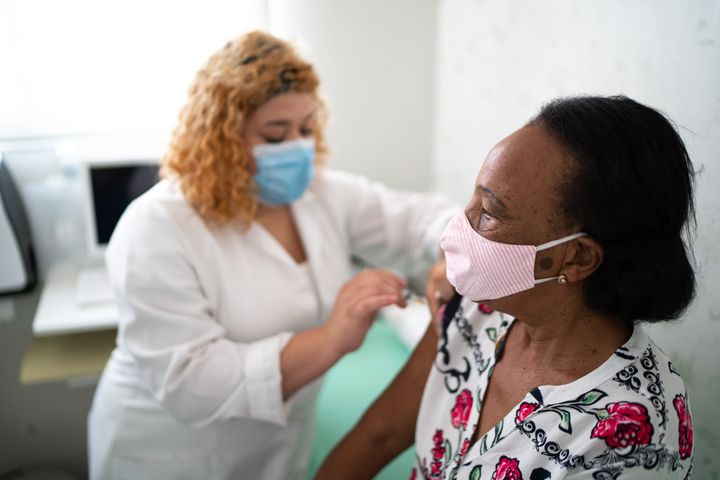News
What Happens If You Skip Or Delay The Second COVID-19 Vaccine Dose?
The coronavirus vaccine is seen as a dream in this long and grueling pandemic. But the rollout has been nothing short of a nightmare. With a lack of available slots, canceled appointments and a yearning for any semblance of normalcy, many would be happy to get just one shot of the vaccine, let alone both of them.
Say that did happen and you got a coveted vaccine appointment for your first dose. Is that enough? Can you skip the second shot? Or, can you take it late if your second appointment got messed up or you can’t make it on the exact day?
Typically, you’ll get a second appointment if you’ve secured your first; most reports of canceled COVID-19 vaccine appointments do not reflect scheduled second doses for those who already received the first one. It’s important to get both in order to achieve full protection from COVID-19. (Unless, of course, you’re given a one-dose vaccine like Johnson and Johnson’s candidate. But since that’s not currently available to the public, we’ll focus on the two-dose immunizations for now.)
That said, there is some wiggle room. Here’s what else to know about the timing of your second coronavirus shot:
One dose of Pfizer’s or Moderna’s vaccine isn’t as effective
Data published in December shows the Pfizer-BioNTech vaccine is only about 52% effective after the first dose. With both shots, research suggests the vaccine is 95% effective.
Moderna says its vaccine is about 80% effective after the first shot, the BBC reported. It’s more than 95% effective in people ages 18 to 65 with both doses; it’s almost 87% effective in those over 65.
It’s OK to get the second COVID-19 shot later than scheduled — just not too late
Depending on which vaccine you’re administered, you’ll be scheduled for your second dose about 21 or 28 days after the first. But don’t panic if you can’t make it on that exact date, said Kavita Patel, HuffPost’s medical contributor and a practicing internal medicine physician in Washington, D.C.
“The CDC has gone on record to state that you can safely get the second dose about 42 days out for Moderna and Pfizer ― you can also get it a couple of days earlier as well,” she said.
It’s currently unknown whether there’s a time that’s too late to take your second dose because that situation hasn’t been studied yet, Patel added. That means it’s also unclear if you have to start all over if too much time has passed after your first dose.
“For other vaccines that are multidose, we don’t necessarily start the series over. … If it’s more than 90 days, I would imagine some might recommend restarting,” Patel said. “But given supply issues, people should get it when they can.”
In other words, don’t skip out on your second dose. If you can’t make it the day it’s scheduled for whatever reason, try rescheduling it close to the day. On the off chance that your second dose appointment is canceled, be sure to press whoever is canceling on when you can reschedule.
In rare cases, you may be able to get a second dose from a different manufacturer
“If people really think that there is no way to get the same manufacturer for the second dose, then the CDC has also said you can substitute a different manufacturer for that second one,” Patel said.
However, this should be considered a last-resort option. “It’s not encouraged but it would be OK ― again only if you cant find the second dose from the same manufacturer,” Patel said.
Just don’t put off getting the second dose entirely
Both Pfizer’s and Moderna’s COVID-19 vaccines require two doses to work. You may gain some level of protection from one shot, but the second booster is vital for complete immunity.
Even if you had side effects, you should still get your second dose. Side effects are a totally normal reaction to the vaccine. It doesn’t mean you’re sick with the coronavirus.
“The second shot can potentially be hard on some people,” Patel said. “I personally felt fatigue and just tired the day after, so I would recommend people try to do what they can to not overload their schedules the day after both shots.”
The only time you should not get your second shot is if your doctor told you not to do so, according to the Centers for Disease Control and Prevention. This may include individuals who had severe allergic reactions to their first dose (which is rare).
Experts are still learning about COVID-19. The information in this story is what was known or available as of publication, but guidance can change as scientists discover more about the virus. Please check the Centers for Disease Control and Prevention for the most updated recommendations.
Read more

